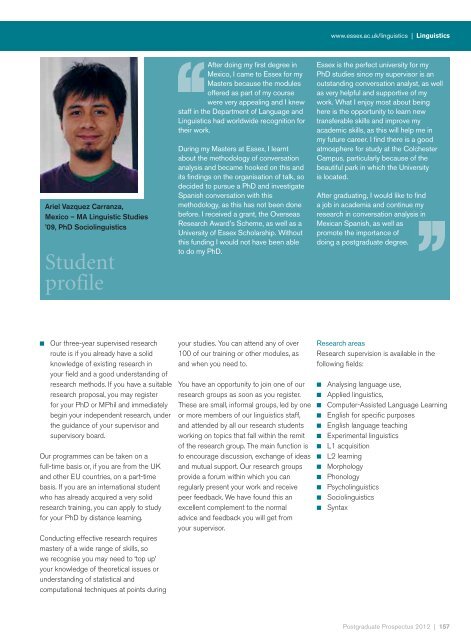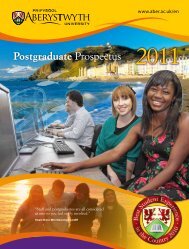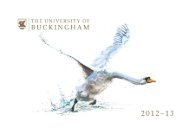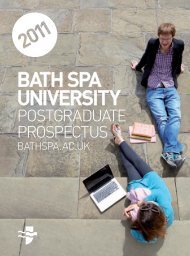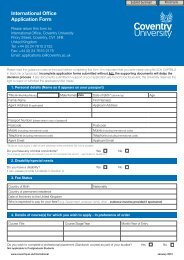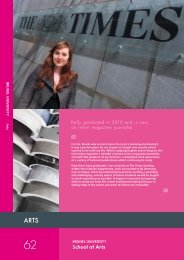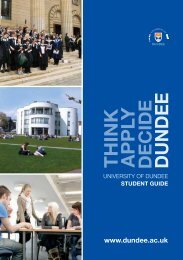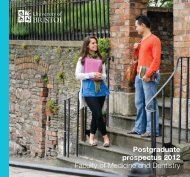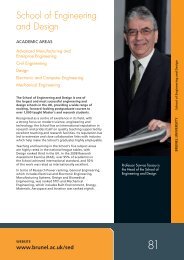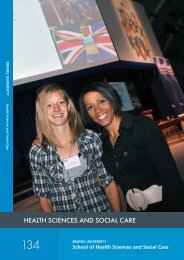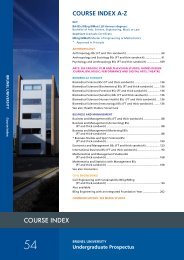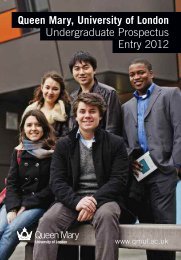Postgraduate Prospectus
Postgraduate Prospectus
Postgraduate Prospectus
Create successful ePaper yourself
Turn your PDF publications into a flip-book with our unique Google optimized e-Paper software.
www.essex.ac.uk/linguistics | Linguistics<br />
Ariel Vazquez Carranza,<br />
Mexico – MA Linguistic Studies<br />
’09, PhD Sociolinguistics<br />
Student<br />
profile<br />
After doing my first degree in<br />
Mexico, I came to Essex for my<br />
Masters because the modules<br />
offered as part of my course<br />
were very appealing and I knew<br />
staff in the Department of Language and<br />
Linguistics had worldwide recognition for<br />
their work.<br />
During my Masters at Essex, I learnt<br />
about the methodology of conversation<br />
analysis and became hooked on this and<br />
its findings on the organisation of talk, so<br />
decided to pursue a PhD and investigate<br />
Spanish conversation with this<br />
methodology, as this has not been done<br />
before. I received a grant, the Overseas<br />
Research Award’s Scheme, as well as a<br />
University of Essex Scholarship. Without<br />
this funding I would not have been able<br />
to do my PhD.<br />
Essex is the perfect university for my<br />
PhD studies since my supervisor is an<br />
outstanding conversation analyst, as well<br />
as very helpful and supportive of my<br />
work. What I enjoy most about being<br />
here is the opportunity to learn new<br />
transferable skills and improve my<br />
academic skills, as this will help me in<br />
my future career. I find there is a good<br />
atmosphere for study at the Colchester<br />
Campus, particularly because of the<br />
beautiful park in which the University<br />
is located.<br />
After graduating, I would like to find<br />
a job in academia and continue my<br />
research in conversation analysis in<br />
Mexican Spanish, as well as<br />
promote the importance of<br />
doing a postgraduate degree.<br />
n<br />
Our three-year supervised research<br />
route is if you already have a solid<br />
knowledge of existing research in<br />
your field and a good understanding of<br />
research methods. If you have a suitable<br />
research proposal, you may register<br />
for your PhD or MPhil and immediately<br />
begin your independent research, under<br />
the guidance of your supervisor and<br />
supervisory board.<br />
Our programmes can be taken on a<br />
full-time basis or, if you are from the UK<br />
and other EU countries, on a part-time<br />
basis. If you are an international student<br />
who has already acquired a very solid<br />
research training, you can apply to study<br />
for your PhD by distance learning.<br />
Conducting effective research requires<br />
mastery of a wide range of skills, so<br />
we recognise you may need to ‘top up’<br />
your knowledge of theoretical issues or<br />
understanding of statistical and<br />
computational techniques at points during<br />
your studies. You can attend any of over<br />
100 of our training or other modules, as<br />
and when you need to.<br />
You have an opportunity to join one of our<br />
research groups as soon as you register.<br />
These are small, informal groups, led by one<br />
or more members of our linguistics staff,<br />
and attended by all our research students<br />
working on topics that fall within the remit<br />
of the research group. The main function is<br />
to encourage discussion, exchange of ideas<br />
and mutual support. Our research groups<br />
provide a forum within which you can<br />
regularly present your work and receive<br />
peer feedback. We have found this an<br />
excellent complement to the normal<br />
advice and feedback you will get from<br />
your supervisor.<br />
Research areas<br />
Research supervision is available in the<br />
following fields:<br />
n Analysing language use,<br />
n Applied linguistics,<br />
n Computer-Assisted Language Learning<br />
n English for specific purposes<br />
n English language teaching<br />
n Experimental linguistics<br />
n L1 acquisition<br />
n L2 learning<br />
n Morphology<br />
n Phonology<br />
n Psycholinguistics<br />
n Sociolinguistics<br />
n Syntax<br />
<strong>Postgraduate</strong> <strong>Prospectus</strong> 2012 | 157


